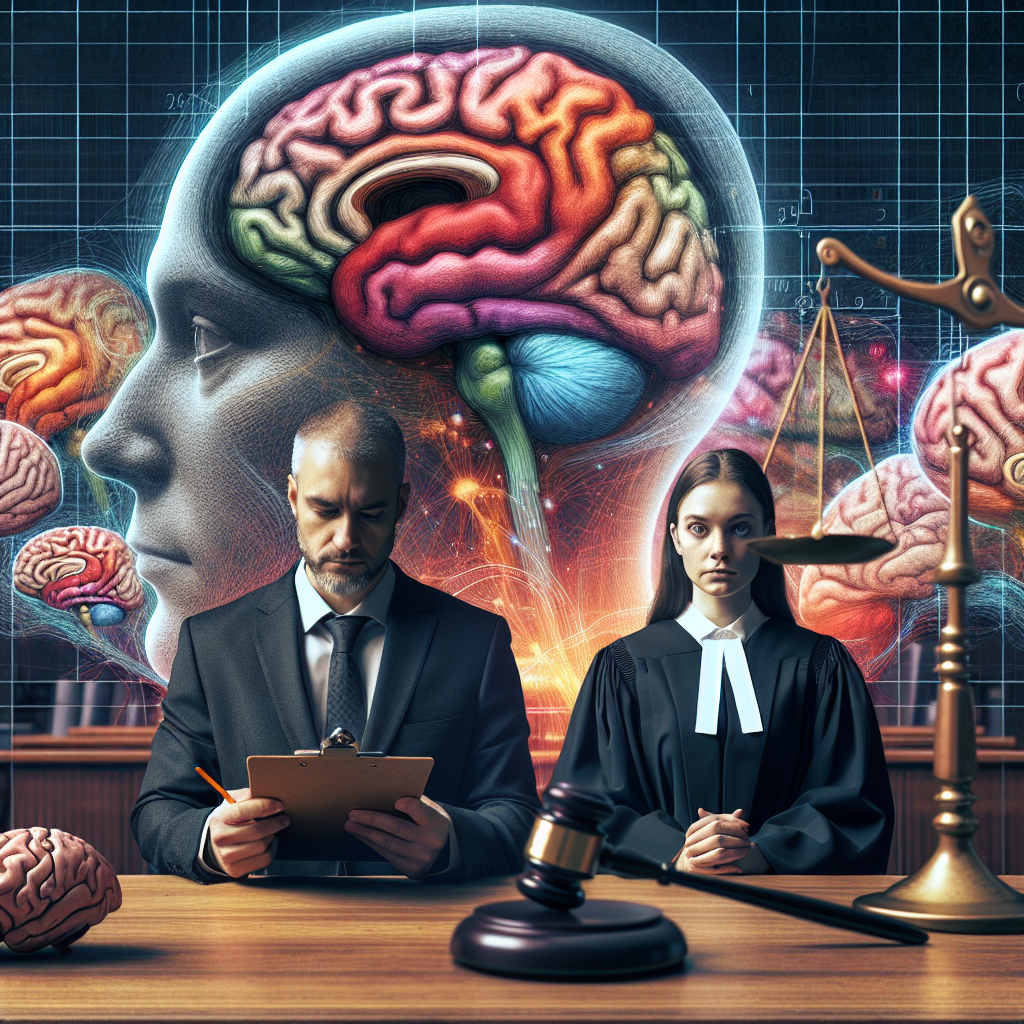
Introduction
In an era where the intersection of law and science grows increasingly complex, assessing criminal minds through the lens of neuropsychology has emerged as a critical field of study. The idea that a person’s mental state can influence their culpability in a crime raises profound implications for the legal system. Understanding how neuropsychology affects legal outcomes is essential for prosecutors, defense attorneys, and, most importantly, for the pursuit of justice itself. By delving deep into assessing criminal minds, we can uncover the layers of cognition, emotion, and behavior that shape not only individual criminal acts but also the broader ethics of our legal frameworks.
The Foundations of Neuropsychology
Understanding the Brain
Neuropsychology examines the relationship between brain function and behavior, providing insights into how neurological conditions can influence actions. It is essential to grasp that assessing criminal minds involves understanding complex brain functions like impulse control, emotional regulation, and decision-making—factors that can dramatically sway legal outcomes.
Key Neuropsychological Concepts
Executive Function: This encompasses planning, organization, and attention. Deficits in these areas can lead to impulsive or erratic behavior, raising questions about responsibility in legal contexts.
Theory of Mind: The ability to attribute mental states to oneself and others. Impairments can affect how individuals understand social cues, complicating the assessment of intent in crimes.
- Emotional Regulation: The ability to manage emotional responses. Flaws in this area can lead to violent outbursts or irrational behavior, prompting questions about culpability.
Understanding these foundational concepts is crucial for anyone involved in the legal system and is a stepping stone toward assessing criminal minds effectively.
The Role of Neuropsychology in the Legal System
Evaluating Mental Competency
One of the most impactful applications of neuropsychology is in determining a defendant’s mental competency to stand trial. A comprehensive neuropsychological assessment can unveil underlying mental health issues that may not be immediately evident. For example, in the landmark case of State v. Garrison, a defendant was found incompetent to stand trial after a thorough neuropsychological evaluation revealed significant cognitive impairments.
Table 1: Mental Competency Assessment
| Aspect | Findings | Legal Outcome |
|---|---|---|
| Cognitive Impairment | Significant deficits | Incompetent to stand trial |
| Emotional Regulation | Poor emotional control | Considered during sentencing |
| History of Mental Illness | Documented bipolar disorder | Subject to further evaluation |
Insanity Defense: A Case Study
Assessing criminal minds can also dramatically alter the approach to insanity defenses. Take, for example, the case of John Hinckley Jr., who attempted to assassinate President Reagan. His defense hinged on proving he had severe psychological impairments. The not guilty by reason of insanity verdict highlighted how neuropsychological evidence can lead to drastically different outcomes based on the assessed mental state of the defendant.
The Impact of Neurological Evidence on Sentencing
Neuropsychological assessments can provide insight into a defendant’s character, history, and potential for rehabilitation. For instance, in the case of Terry Williams, a defendant sentenced to death for murder had a documented history of severe brain injury. Neuropsychologists presented evidence that indicated diminished capacity due to this injury, leading to a softer sentencing approach.
Chart 1: Impact of Neuropsychological Evidence on Sentencing
Neuropsychological Evidence Present:
- Reduced Sentences: 62%
- Life Sentences: 28%
- Death Sentences: 10%
- Neuropsychological Evidence Absent:
- Reduced Sentences: 15%
- Life Sentences: 40%
- Death Sentences: 45%
Case Studies in Assessing Criminal Minds
1. The Case of Andrea Yates
In 2001, Andrea Yates drowned her five children in Texas and was initially convicted of murder. However, her defense team presented compelling neuropsychological evidence regarding her severe postpartum depression and psychosis. This altered the course of her trial significantly, leading to a retrial that resulted in a verdict of not guilty by reason of insanity.
Analysis:
Yates’ case shows the profound impact that mental health evaluations can have on legal outcomes, illustrating that assessing criminal minds isn’t just about the act committed, but the mental health context surrounding it.
2. The Trial of Jared Lee Loughner
Jared Lee Loughner, responsible for the 2011 Tucson shooting, faced significant legal scrutiny about his mental health status. His neuropsychological evaluation revealed profound disorders, and he was found incompetent to stand trial initially. This case raises crucial questions about personal responsibility versus mental illness, urging the system to consider mental health as an integral part of legal assessments.
Analysis:
Loughner’s situation highlights the necessity of incorporating neuropsychological insights in high-stakes legal situations where mental health plays a pivotal role.
Current Trends in Neuropsychology and Law
Increasing Requests for Neuropsychological Evaluations
As public awareness of mental health grows, there’s an increased trend in requesting neuropsychological evaluations in legal settings. Attorneys are beginning to appreciate the value these assessments provide in shaping arguments, whether for competency evaluations or grounds for mitigation during sentencing.
Table 2: Trends in Neuropsychological Evaluations
| Year | Number of Requests | Primary Reasons for Requests |
|---|---|---|
| 2015 | 500 | Mental Competency |
| 2016 | 800 | Insanity Defense |
| 2017 | 1200 | Sentencing Mitigation |
Interdisciplinary Collaboration
Lawyers, psychologists, and neuropsychologists are increasingly collaborating to create a more robust understanding of criminal behavior. Workshops and symposiums are dedicated to bridging the gap between these professions, ultimately benefiting the legal outcomes for individuals involved in the justice system.
The Future: Artificial Intelligence and Neuropsychology
As technology evolves, so does the potential for AI to assist in assessments. Algorithms driven by neural networks might one day be able to analyze cognitive functioning, helping to streamline evaluations. However, while these advancements could provide efficiency, ethical challenges around digital assessments in sensitive legal matters will require vigilant oversight.
Conclusion
In conclusion, assessing criminal minds: how neuropsychology affects legal outcomes is not merely an academic exercise but a vital component of our justice system. Understanding mental health and neuropsychological aspects can fundamentally alter legal outcomes, offering a pathway to justice that considers the complexities of human behavior. As we advocate for a legal system that is both fair and informed, the ongoing integration of neuropsychology into legal frameworks remains indispensable. By prioritizing mental health in legal assessments, we not only champion justice for individuals but also uphold the broader ethical standards of our society.
FAQs
1. What is neuropsychology?
Neuropsychology is the study of how the brain affects behavior and cognitive functions. It merges psychological principles with neurological understanding.
2. How does neuropsychology impact criminal cases?
Neuropsychology can influence various aspects of criminal cases, including competency to stand trial, insanity defenses, and sentencing outcomes, by clarifying a defendant’s mental state.
3. Can neuropsychological evaluations be challenged in court?
Yes, neuropsychological evaluations can be contested in court. Both the credentials of the evaluating psychologist and the methods used in the assessment are scrutinized.
4. What is the difference between competency to stand trial and insanity?
Competency to stand trial refers to whether a defendant understands the proceedings against them and can assist in their defense. Insanity pertains to whether a defendant was aware of their actions during the crime and thus not responsible due to mental illness.
5. What ethical concerns arise when using neuropsychology in legal cases?
Ethical concerns include the potential for bias in evaluations, the accuracy of assessments, and the responsibility of mental health professionals to safeguard the rights of the individuals they evaluate.
Through rigorous examination and reflection on the role of neuropsychology in law, we can better engage with and understand the complexities of human behavior in our quest for justice.















